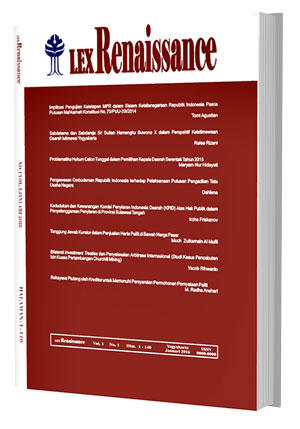Main Article Content
Abstract
The purpose of this research is to examine the reality that happens in the practice of notaries that often occurs and unavoidable, namely where the applicants do not come before the notary at the same time. This is common almost every region. Not only violating the principle of propriety, it is also a sporadic habit that is considered a trivial matter. This is a juridical-empirical legal research on the implementation of normative legal provisions in real behavior that occurs in society. The results of the study conclude that the lack of awareness of the Notary in practicing and implementing authentic deed-making procedures based on the provisions of the Law and the weak supervision of the institutions that are obliged to supervise Notaries in carrying out their duties and functions, making the Notary who is a bank partner does not read out and ensure that the deed is signed properly together. Furthermore, the reading and signing of the deed that was not carried out in front of a notary would result in a decrease in the authenticity value of the deed into an under-hand deed.
Keywords
Article Details
Authors who publish with this journal agree to the following terms:
a. Authors retain copyright and grant the journal right of first publication with the work simultaneously licensed under a Creative Commons Attribution License that allows others to share the work with an acknowledgement of the work's authorship and initial publication in this journal.
b. Authors are able to enter into separate, additional contractual arrangements for the non-exclusive distribution of the journal's published version of the work (e.g., post it to an institutional repository or publish it in a book), with an acknowledgement of its initial publication in this journal.
c. Authors are permitted and encouraged to post their work online (e.g., in institutional repositories or on their website) prior to and during the submission process, as it can lead to productive exchanges, as well as earlier and greater citation of published work (See The Effect of Open Access).References
- Buku
- Adjie, Habib, Sanksi Perdata dan Administratif Terhadap Notaris Sebagai Pejabat Publik, Bandung, Refika Aditama, 2009.
- ______, Hukum Notaris Indonesia; Tafsir Tematik Terhadap Undang-Undang Nomor 30 Tahun 2004 Tentang Jabatan Notaris, Cetakan Keempat, Bandung: PT. Refika Aditama, 2014.
- Anshori, Abdul Ghofur, Lembaga Kenotariatan Indonesia; Perspektif Hukum dan Etika, Cetakan Pertama, Yogyakarta, UII Press, 2009.
- Bahsan, M., Hukum Jamninan dan Jaminan Kredit Perbankan Indonesia, Jakarta, PT. RajaGrafindo Persada, 2007.
- Daurus, Muhammad Luthfan Hadi, Hukum Notariat dan Tanggung Jawab Jabatan Notaris, Cetakan Pertama, Yogyakarta, UII Press, 2017.
- Notosoedirjo, R. Soegondo, Hukum Notariat di Indonesia; Suatu Penjelasan, Jakarta, PT. RajaGrafindo Persada, 1993.
- Sulihandari, Hartanti dan Nisya Rifiani, Prinsip-Prinsip Dasar Profesi Notaris, Jakarta, Dunia Cerdas, 2013.
- Susanto, Herry, Peran Notaris Dalam Menciptakan Kepatutan Dalam Kontrak, Yogyakarta, UII Press, 2010.
- Peraturan Perundang-undangan
- Kitab Undang-Undang Hukum Perdata.
- Undang-Undang Nomor 5 Tahun 1986 tentang Peradilan Tata Usaha Negara.
- Undang-Undang Nomor 4 Tahun 1996 tentang Hak Tanggungan Atas Tanah Beserta Benda-Benda yang Berkaitan Dengan Tanah.
- Undang-Undang Nomor 10 Tahun 1998 tentang Perbankan.
- Undang-Undang Nomor 2 Tahun 2014 tentang Perubahan Atas Undang-Undang Nomor 30 Tahun 2004 tentang Jabatan Notaris.
- Peraturan Pemerintah Republik Indonesia Nomor 24 Tahun 2016 tentang Perubahan Atas Peraturan Pemerintah Nomor 37 Tahun 1998 tentang Peraturan Jabatan Pejabat Pembuat Akta Tanah.
- Permenkumham Nomor M.02.PR.08.10 Tahun 2004 tentang Tata Cara Pengangkatan Anggota, Pemberhentian Anggota Susunan Organisasi, Tata Cara Kerja dan Tata Cata Pemeriksaan Majelis Pengawas Notaris.
- Keputusan Menteri Keuangan Republik Indonesia Nomor 338/KMK.01/2000 tentang Pejabat Lelang.
- Kode Etik Notaris Ikatan Notaris Indonesia.
- Anggaran Dasar Ikatan Notaris Indonesia (INI).
References
Buku
Adjie, Habib, Sanksi Perdata dan Administratif Terhadap Notaris Sebagai Pejabat Publik, Bandung, Refika Aditama, 2009.
______, Hukum Notaris Indonesia; Tafsir Tematik Terhadap Undang-Undang Nomor 30 Tahun 2004 Tentang Jabatan Notaris, Cetakan Keempat, Bandung: PT. Refika Aditama, 2014.
Anshori, Abdul Ghofur, Lembaga Kenotariatan Indonesia; Perspektif Hukum dan Etika, Cetakan Pertama, Yogyakarta, UII Press, 2009.
Bahsan, M., Hukum Jamninan dan Jaminan Kredit Perbankan Indonesia, Jakarta, PT. RajaGrafindo Persada, 2007.
Daurus, Muhammad Luthfan Hadi, Hukum Notariat dan Tanggung Jawab Jabatan Notaris, Cetakan Pertama, Yogyakarta, UII Press, 2017.
Notosoedirjo, R. Soegondo, Hukum Notariat di Indonesia; Suatu Penjelasan, Jakarta, PT. RajaGrafindo Persada, 1993.
Sulihandari, Hartanti dan Nisya Rifiani, Prinsip-Prinsip Dasar Profesi Notaris, Jakarta, Dunia Cerdas, 2013.
Susanto, Herry, Peran Notaris Dalam Menciptakan Kepatutan Dalam Kontrak, Yogyakarta, UII Press, 2010.
Peraturan Perundang-undangan
Kitab Undang-Undang Hukum Perdata.
Undang-Undang Nomor 5 Tahun 1986 tentang Peradilan Tata Usaha Negara.
Undang-Undang Nomor 4 Tahun 1996 tentang Hak Tanggungan Atas Tanah Beserta Benda-Benda yang Berkaitan Dengan Tanah.
Undang-Undang Nomor 10 Tahun 1998 tentang Perbankan.
Undang-Undang Nomor 2 Tahun 2014 tentang Perubahan Atas Undang-Undang Nomor 30 Tahun 2004 tentang Jabatan Notaris.
Peraturan Pemerintah Republik Indonesia Nomor 24 Tahun 2016 tentang Perubahan Atas Peraturan Pemerintah Nomor 37 Tahun 1998 tentang Peraturan Jabatan Pejabat Pembuat Akta Tanah.
Permenkumham Nomor M.02.PR.08.10 Tahun 2004 tentang Tata Cara Pengangkatan Anggota, Pemberhentian Anggota Susunan Organisasi, Tata Cara Kerja dan Tata Cata Pemeriksaan Majelis Pengawas Notaris.
Keputusan Menteri Keuangan Republik Indonesia Nomor 338/KMK.01/2000 tentang Pejabat Lelang.
Kode Etik Notaris Ikatan Notaris Indonesia.
Anggaran Dasar Ikatan Notaris Indonesia (INI).




